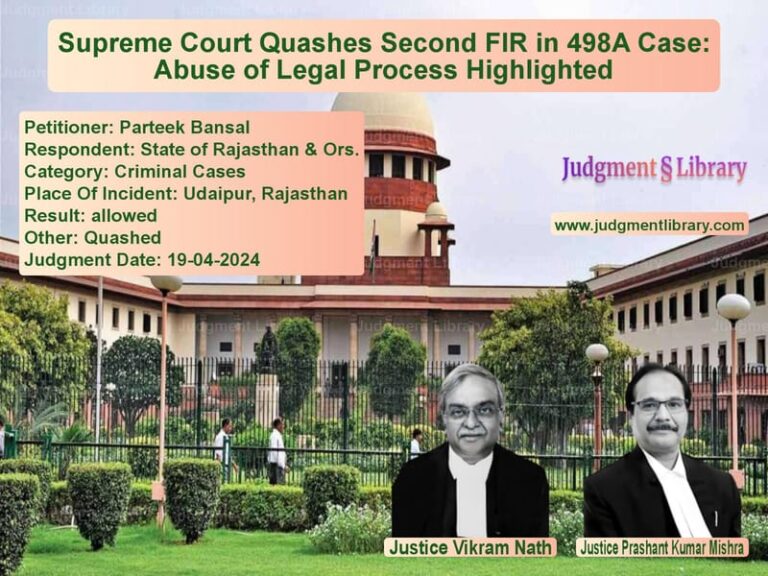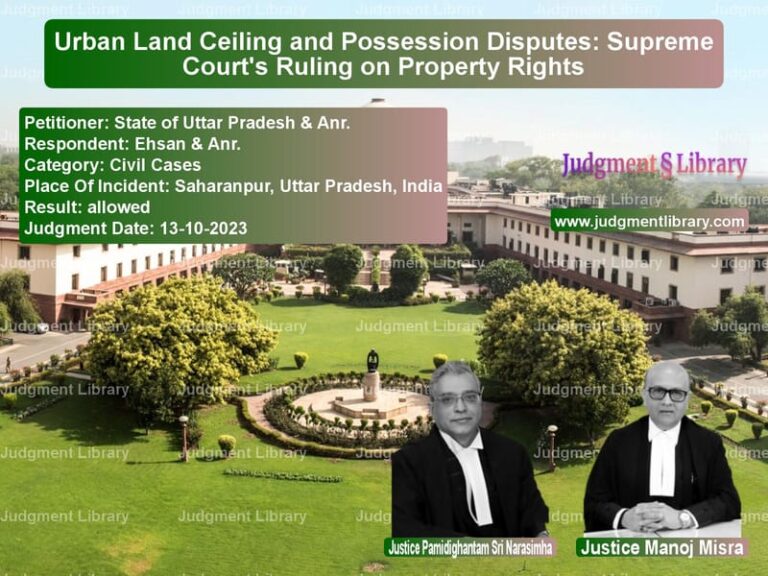Supreme Court Commutes Death Sentence in Karnataka Double Murder Case
In a significant judgment, the Supreme Court of India commuted the death sentence of Ramesh A. Naika, who was convicted of murdering his two children. The Court upheld the conviction but modified the sentence, imposing life imprisonment without remission, emphasizing that capital punishment should be reserved for the rarest of rare cases. The ruling underscores the judiciary’s cautious approach in awarding the death penalty and the importance of considering mitigating factors.
Background of the Case
The case revolved around the brutal killing of two minor children, Bhuvanraj (10 years old) and Krithika (3.5 years old), by their father, Ramesh A. Naika. The appellant, a bank manager, was accused of committing the murders due to disputes within his wife’s family regarding the marriage of her sister. The prosecution alleged that he killed his sister-in-law and mother-in-law before drowning his children in a water tank.
The trial court convicted him under Section 302 of the Indian Penal Code (IPC) and sentenced him to death. The Karnataka High Court upheld the conviction and confirmed the death sentence, leading to an appeal before the Supreme Court.
Key Legal Issues
- Whether the circumstantial evidence sufficiently established the guilt of the accused.
- Whether the case met the criteria for awarding the death penalty under the ‘rarest of rare’ doctrine.
- Consideration of mitigating factors in sentencing.
Arguments by the Appellant
The appellant, through his counsel, raised several arguments:
- The conviction was based purely on circumstantial evidence, lacking direct proof of his involvement in the crime.
- The High Court failed to properly consider mitigating factors, including the accused’s lack of criminal antecedents.
- The accused had no prior history of violent behavior and was well-regarded in society.
- Sentencing him to death without considering the possibility of reform was against the principles laid down in previous Supreme Court judgments.
“The appellant deeply regrets the loss of his children and seeks an opportunity to atone for his actions rather than facing irreversible capital punishment.”
Arguments by the Respondents
The prosecution and the State of Karnataka opposed the appeal, contending:
- The accused meticulously planned the murder, which was evidenced by his actions before and after the crime.
- The brutality of the act—drowning his own children—demonstrated a complete disregard for human life.
- The case fell within the ‘rarest of rare’ category, justifying the death penalty.
- The sentence should act as a deterrent for such heinous crimes.
“The depraved and calculated nature of the crime leaves no scope for leniency. The death penalty is the only appropriate punishment.”
Supreme Court’s Observations
The Supreme Court thoroughly analyzed the case and provided key observations:
- The circumstantial evidence presented by the prosecution formed an unbroken chain linking the accused to the crime.
- However, sentencing must be based on a balance of aggravating and mitigating factors.
- The absence of prior criminal behavior indicated that the accused was not beyond reformation.
- There was no evidence to suggest that the accused posed a continued threat to society.
- Life imprisonment without remission would be a more appropriate punishment, ensuring justice while avoiding irreversible capital punishment.
“While the crime is undoubtedly horrific, capital punishment should be imposed only when the possibility of reformation is completely foreclosed.”
Final Judgment
The Supreme Court ruled:
“The conviction under Section 302 IPC is upheld. However, the death sentence is modified to life imprisonment without the possibility of remission. The accused shall remain incarcerated for the remainder of his natural life.”
This ruling signifies the Court’s adherence to the principle that death penalty cases must be approached with the utmost caution.
Significance of the Judgment
This decision has several critical implications:
- It reinforces the cautious application of the death penalty in cases based on circumstantial evidence.
- It affirms the necessity of considering mitigating factors before awarding capital punishment.
- It highlights the importance of judicial discretion in balancing retributive justice with the possibility of rehabilitation.
The judgment serves as a guiding precedent for future cases involving the death penalty, ensuring that capital punishment is imposed only when absolutely necessary.
Petitioner Name: Ramesh A. Naika.Respondent Name: Registrar General, High Court of Karnataka.Judgment By: Justice Vikram Nath, Justice Sanjay Karol, Justice Sandeep Mehta.Place Of Incident: Mangalore, Karnataka.Judgment Date: 13-02-2025.
Don’t miss out on the full details! Download the complete judgment in PDF format below and gain valuable insights instantly!
Download Judgment: ramesh-a.-naika-vs-registrar-general,-h-supreme-court-of-india-judgment-dated-13-02-2025.pdf
Directly Download Judgment: Directly download this Judgment
See all petitions in Murder Cases
See all petitions in Bail and Anticipatory Bail
See all petitions in Judgment by Vikram Nath
See all petitions in Judgment by Sanjay Karol
See all petitions in Judgment by Sandeep Mehta
See all petitions in partially allowed
See all petitions in Modified
See all petitions in supreme court of India judgments February 2025
See all petitions in 2025 judgments
See all posts in Criminal Cases Category
See all allowed petitions in Criminal Cases Category
See all Dismissed petitions in Criminal Cases Category
See all partially allowed petitions in Criminal Cases Category







